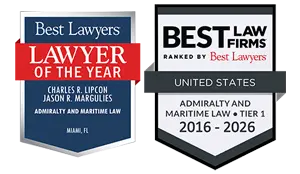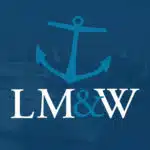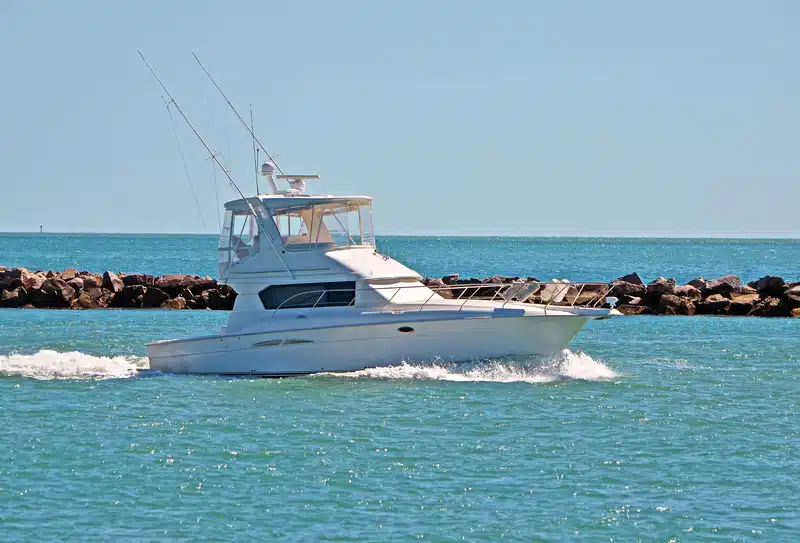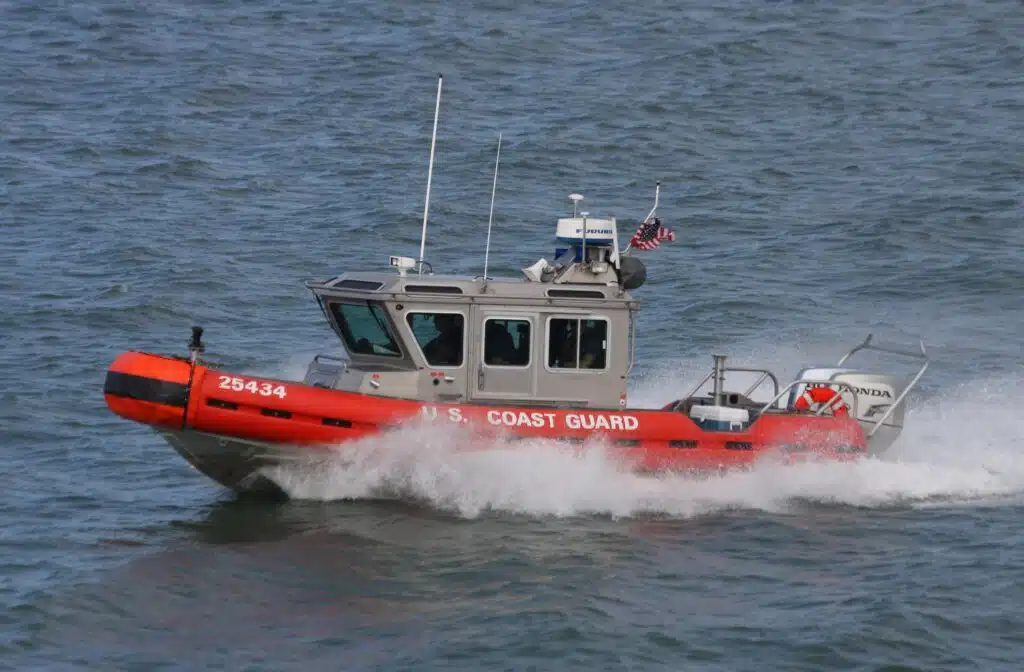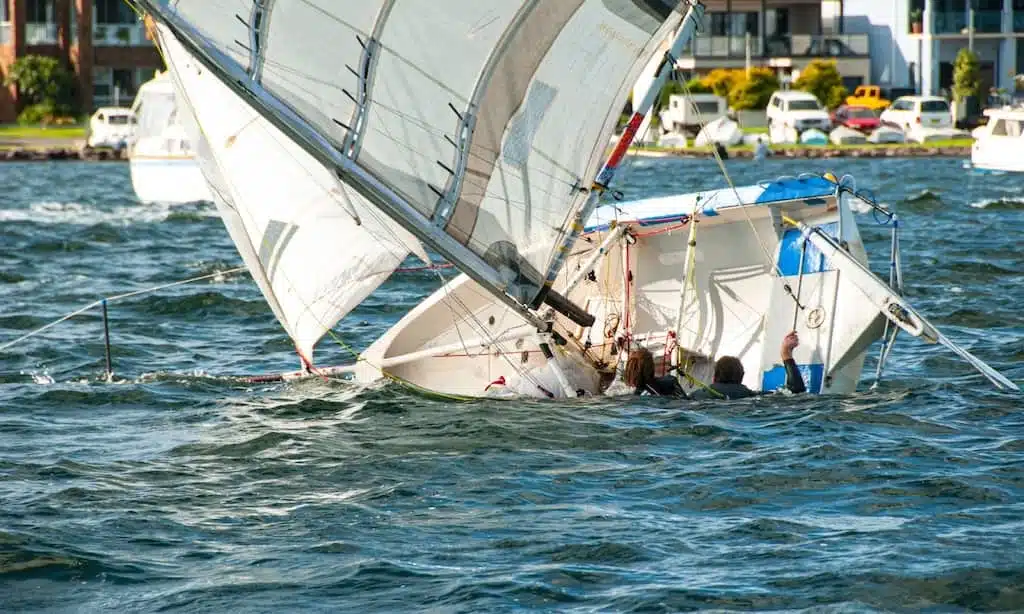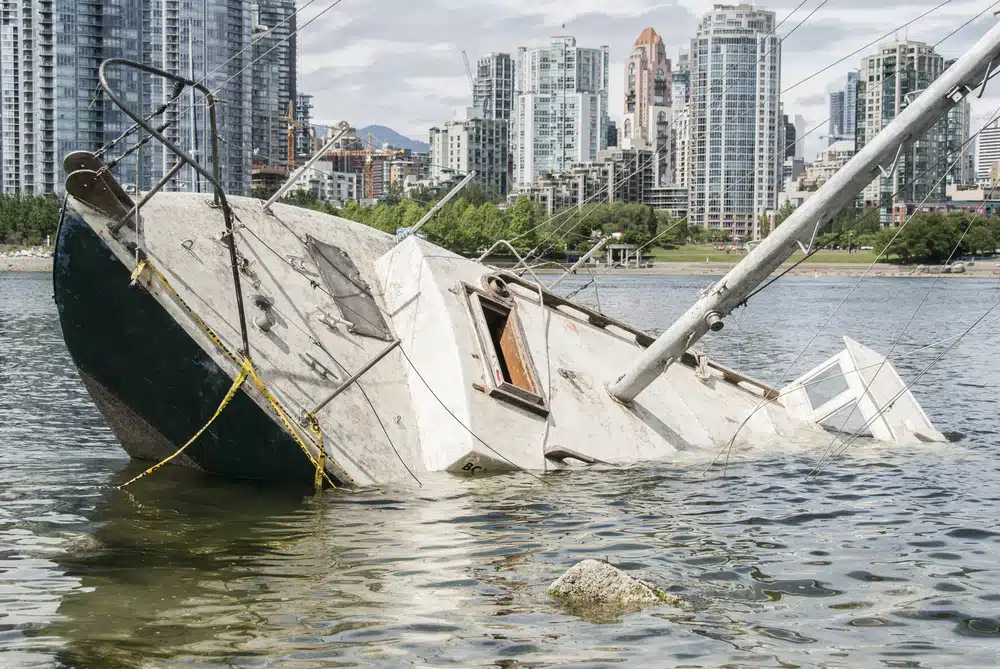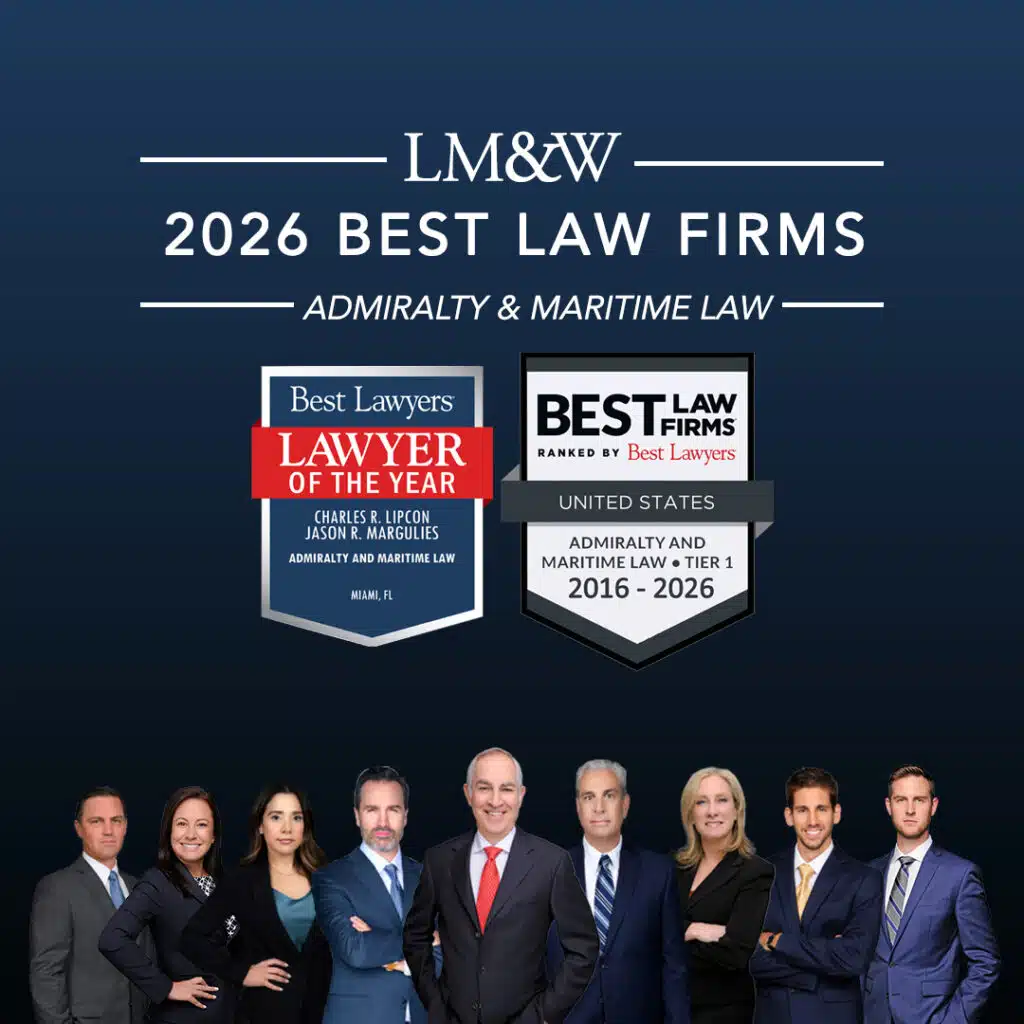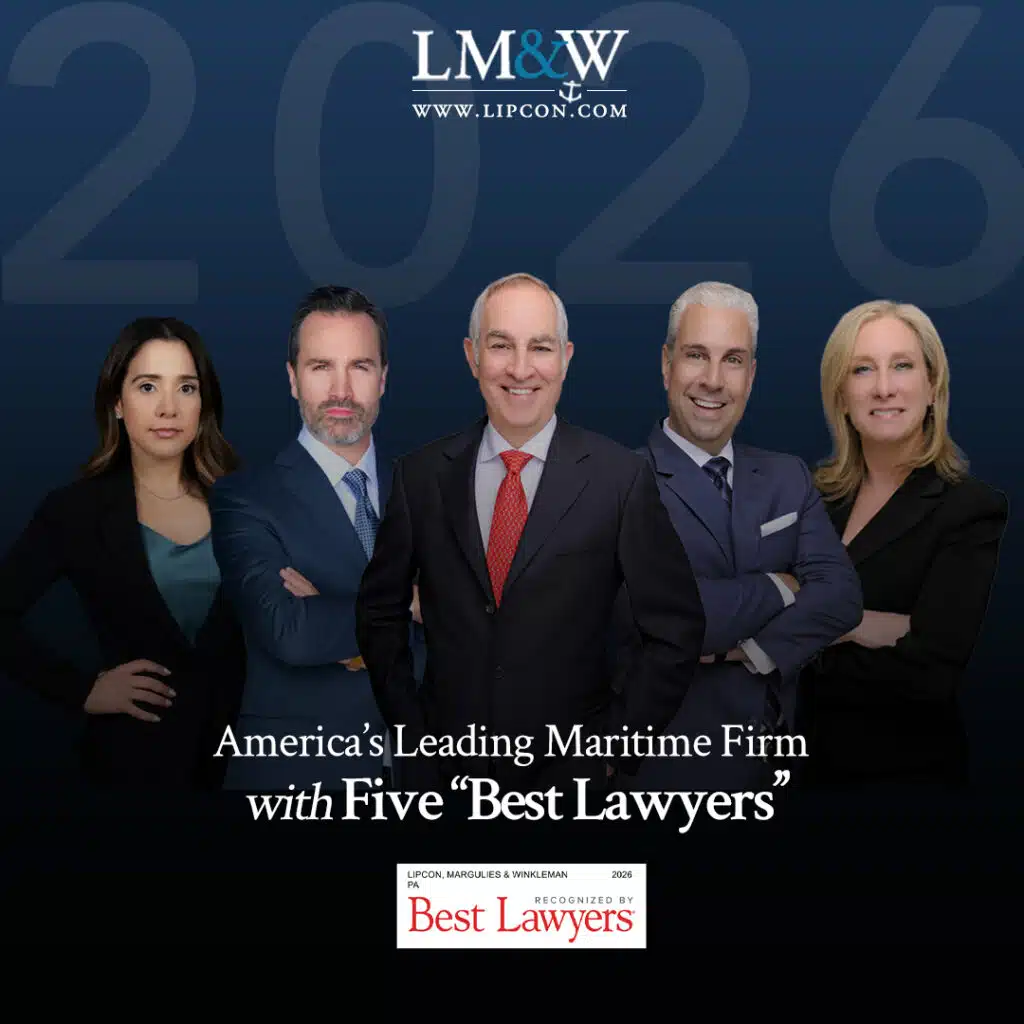Lipcon, Margulies & Winkleman, P.A. is dedicated to holding dangerous or negligent parties accountable for failing to meet boating safety standards. With our headquarters in Miami, FL, and seven offices nationwide, we are well-equipped to assist you, no matter where your accident or incident occurred.
Our team of 19 award-winning attorneys has been recognized by “Best Lawyers”® and “Best Law Firms”® by US News & World Report for the past nine years. Since opening our doors in 1971, we’ve handled over 4,000 cases and recovered more than $500 million for our clients.
Lipcon, Margulies & Winkleman, P.A. also takes great pride in celebrating the achievements of Charles Lipcon (2020) and Jason R. Margulies (2025), who were both named “Lawyer of the Year” in Admiralty and Maritime Law for Miami, a rare lifetime achievement held by two members of our firm.
We offer dedicated legal support for maritime and admiralty law cases, ensuring our clients receive expert representation tailored to the unique demands of these matters. For clients involved in boating incidents, we provide robust strategies designed to protect their rights and interests throughout the legal process. A unique set of laws and regulations apply to boating accidents, and we are well trained in navigating these laws in order to maximize your recovery. Some of these regulations are set out below in order to help you understand some of the unique rules and regulations at issue in a typical maritime injury case.
Main Federal Regulations Affecting Recreational Boating
The U.S. Coast Guard enforces federal boating safety regulations to protect recreational boaters. All recreational boats, including personal watercraft, must carry U.S. Coast Guard-approved safety equipment, such as personal flotation devices (PFDs) for every person on board.
Vessel operators are often required to complete approved boater safety courses to ensure responsible and knowledgeable operation. Boater education programs, endorsed by national associations and the Coast Guard, cover essential topics like navigation rules, weather awareness, and proper use of safety equipment.
Compliance with these regulations helps reduce accidents and prepares boaters to respond effectively in emergencies.
In our vast experience, a significant majority of boating injury cases stem from the failure to follow these regulations.
State-Specific Boating Laws
Boating laws differ significantly from state to state, reflecting local water conditions, safety concerns, and regulatory priorities. These variations are often influenced and enforced by state boating law administrators, who work to ensure public safety on the waterways. Key areas where state laws vary include:
Boater Education Requirements: As of 2025, 36 states require some form of mandatory boater safety education or boater safety courses for individuals operating motorized vessels. New York requires all motorized boat operators to complete a safe boating course and obtain a boating safety certificate starting in 2025. Other states have similar mandates, often requiring operators born after a certain year to complete an approved boater safety course to legally operate a vessel.
Age Restrictions: Minimum age limits for operating boats or personal watercraft differ, with some states imposing strict age thresholds and supervision rules. In California, the minimum age to operate a motorized boat is 16 years, while in Florida, it is 14.
Safety Equipment Required: While federal law sets baseline safety equipment standards, states may require additional items such as fire extinguishers, visual distress signals, or sound-producing devices. For example, California requires boaters to carry additional safety equipment beyond federal baseline standards. It requires all vessels to have a fire extinguisher onboard if the boat has an enclosed engine compartment or fuel tank.
Operating Rules: States may have unique rules regarding speed limits, no-wake zones, alcohol consumption, and navigation to address local hazards and traffic. For example, Florida has specific boating laws that reflect its busy waterways and popular recreational areas. The state enforces strict no-wake zones in designated areas such as marinas, canals, and environmentally sensitive regions to protect wildlife and prevent shoreline erosion.
Registration and Licensing: Registration fees, licensing requirements, and boating license mandates vary widely, with some states requiring licenses for all operators with actual physical control of the vessel and others only for specific boat types.
Because of these variations, it’s important for boaters to familiarize themselves with the specific laws in the state where their accident occurred. Consulting an experienced boat accident lawyer can help clarify legal obligations and rights under state-specific boating laws.
Common Legal Issues in Boating
Accidents
Boating accidents often arise when vessel operators fail to act in a reasonable and prudent manner, especially in challenging conditions like restricted visibility or congested waterways. Whether involving recreational vessels or commercial boats, collisions frequently occur due to poor judgment, failure to maintain a proper lookout, or misjudging the actions of another vessel. These accidents can result in serious injuries or property damage, making it essential to investigate the circumstances thoroughly to determine fault and liability.
Injuries
Injuries sustained during boating accidents can range from minor cuts and bruises to life-threatening trauma. Many injuries result from reckless operation or careless operation of recreational vessels, such as speeding, abrupt maneuvers, or failure to use safety equipment properly. Victims of boating injuries often face long recovery periods and significant medical expenses, underscoring the importance of holding negligent parties accountable and pursuing rightful compensation.
Negligence
Negligence in boating accidents typically involves a boat operator’s failure to exercise the level of care required under the circumstances, such as not operating the vessel in a reasonable and prudent manner. This includes reckless operation, careless operation, or failing to follow navigation rules, especially in conditions like restricted visibility. Part of meeting the legal threshold of “safe operation” means doing what is necessary to avoid collision with any other vessel. Establishing negligence is crucial in boating accident cases, as it determines who can be held liable for damages and injuries sustained during the incident.
Contact the Nation’s Leading Maritime Attorneys to Discuss Your Claim
Whether it’s traveling at too high a speed or not giving up the right of way, a careless boat operator can cause injuries and death to others on the water. Following boating laws saves lives. When someone doesn’t, they deserve to be held accountable. Our experienced legal team is dedicated to doing so. Recognized as one of the “Best Law Firms”® by US News & World Report every year since 2016, our attorneys are well-versed in maritime and personal injury law, ensuring that your rights are protected and that you receive the compensation you deserve.
With over 250 years of combined experience, we are uniquely equipped to maximize your financial compensation and demand accountability from negligent or irresponsible parties. Schedule a no-cost, risk-free consultation today to start taking back control of your life. Reach us through our secure contact form or by phone at 877–233–1238 for your no-obligation case evaluation.
Published on August 4, 2025
Categories: Boating Accidents
Get Free
Consultation


